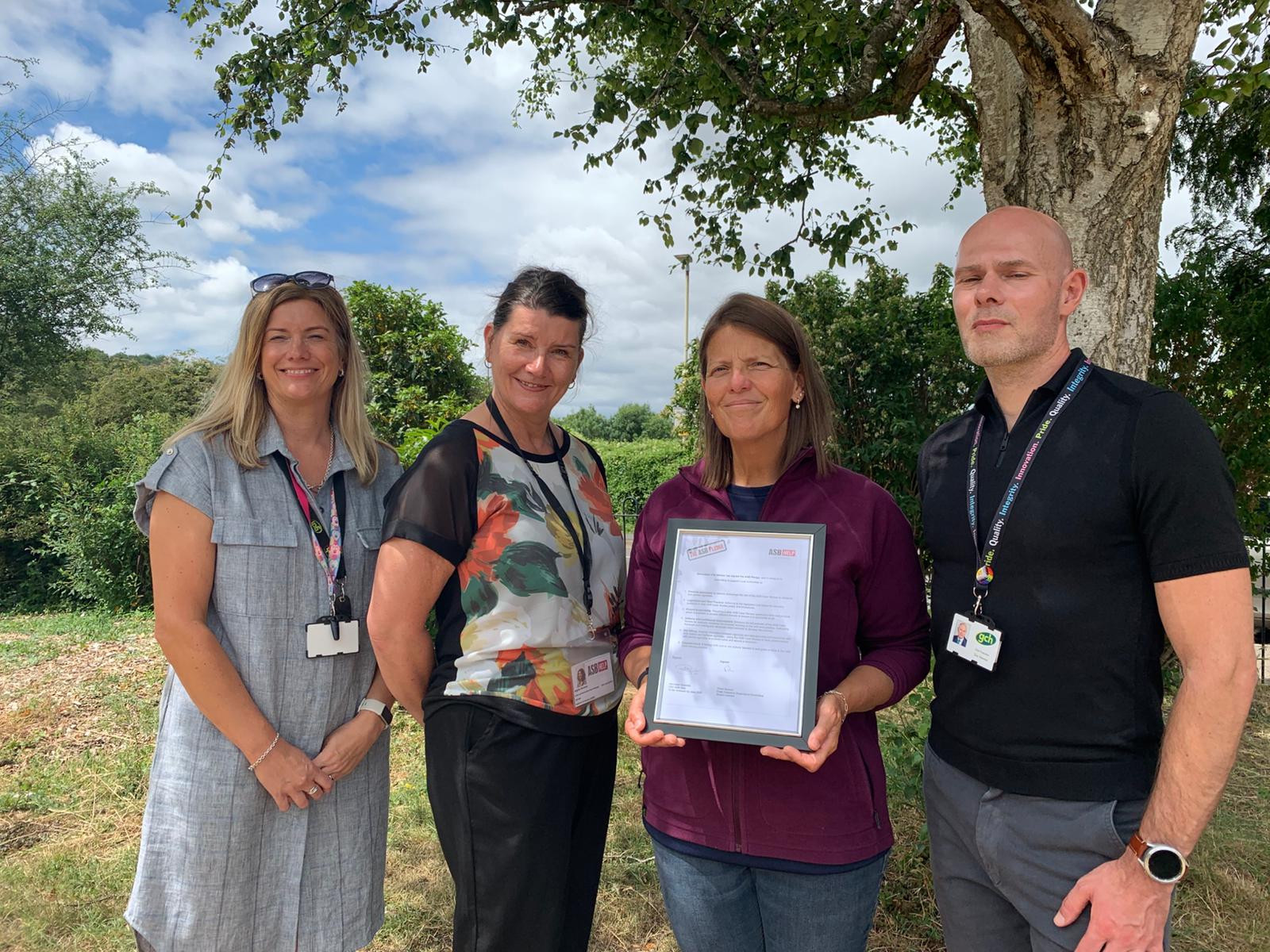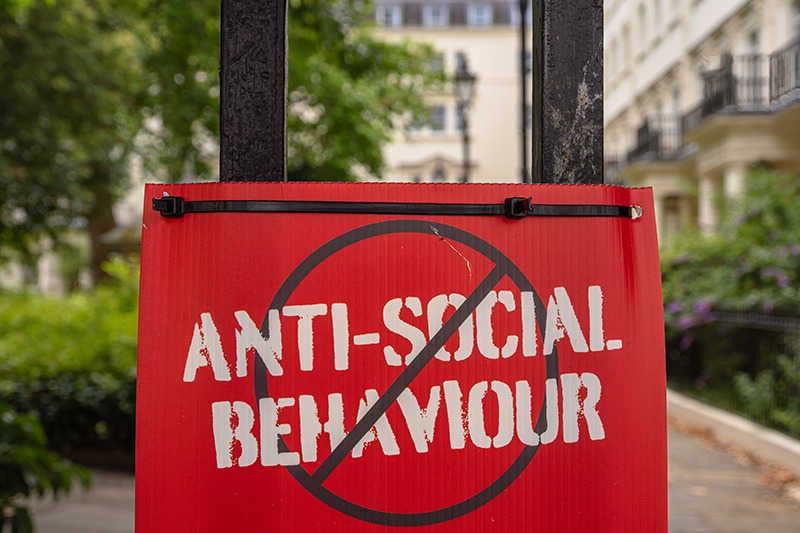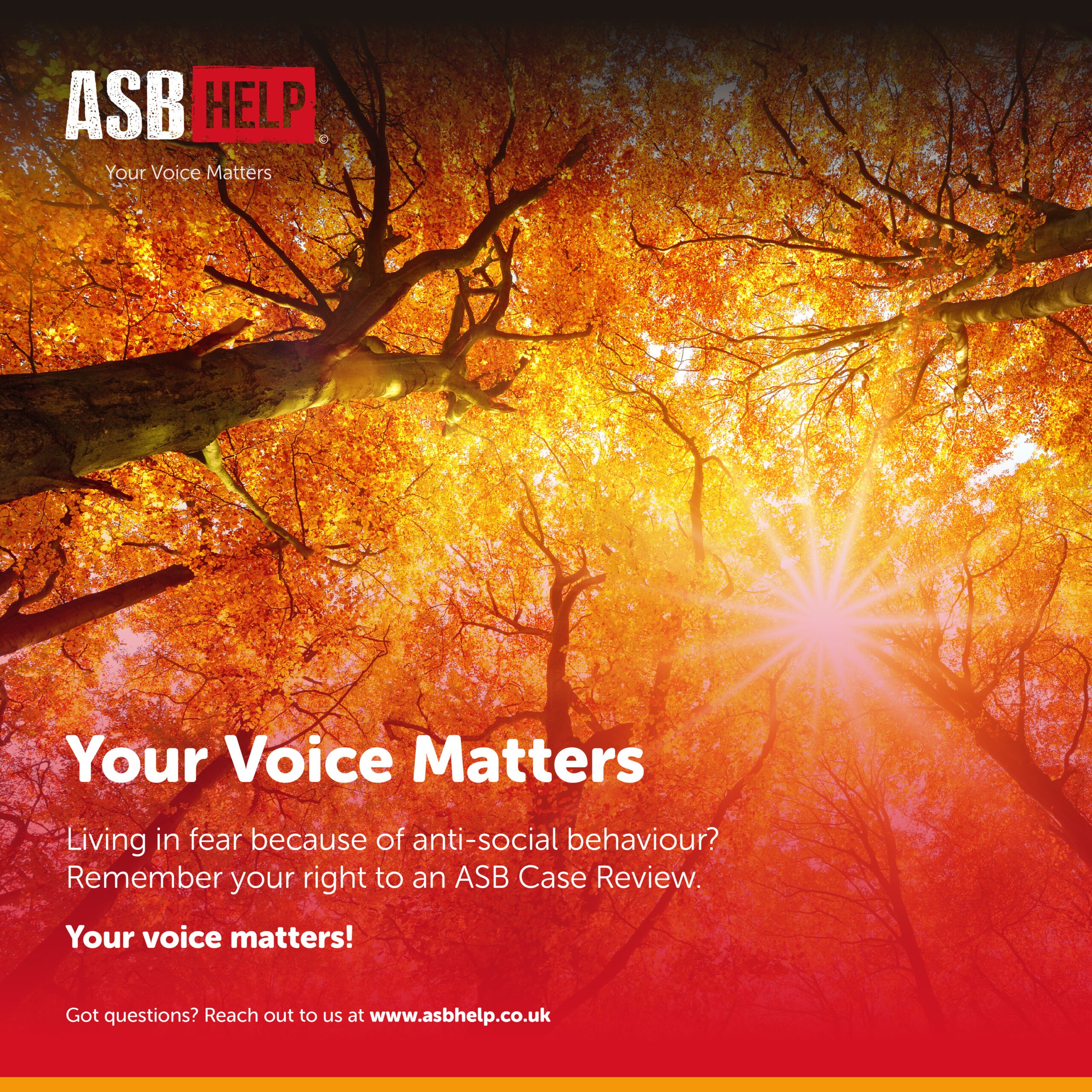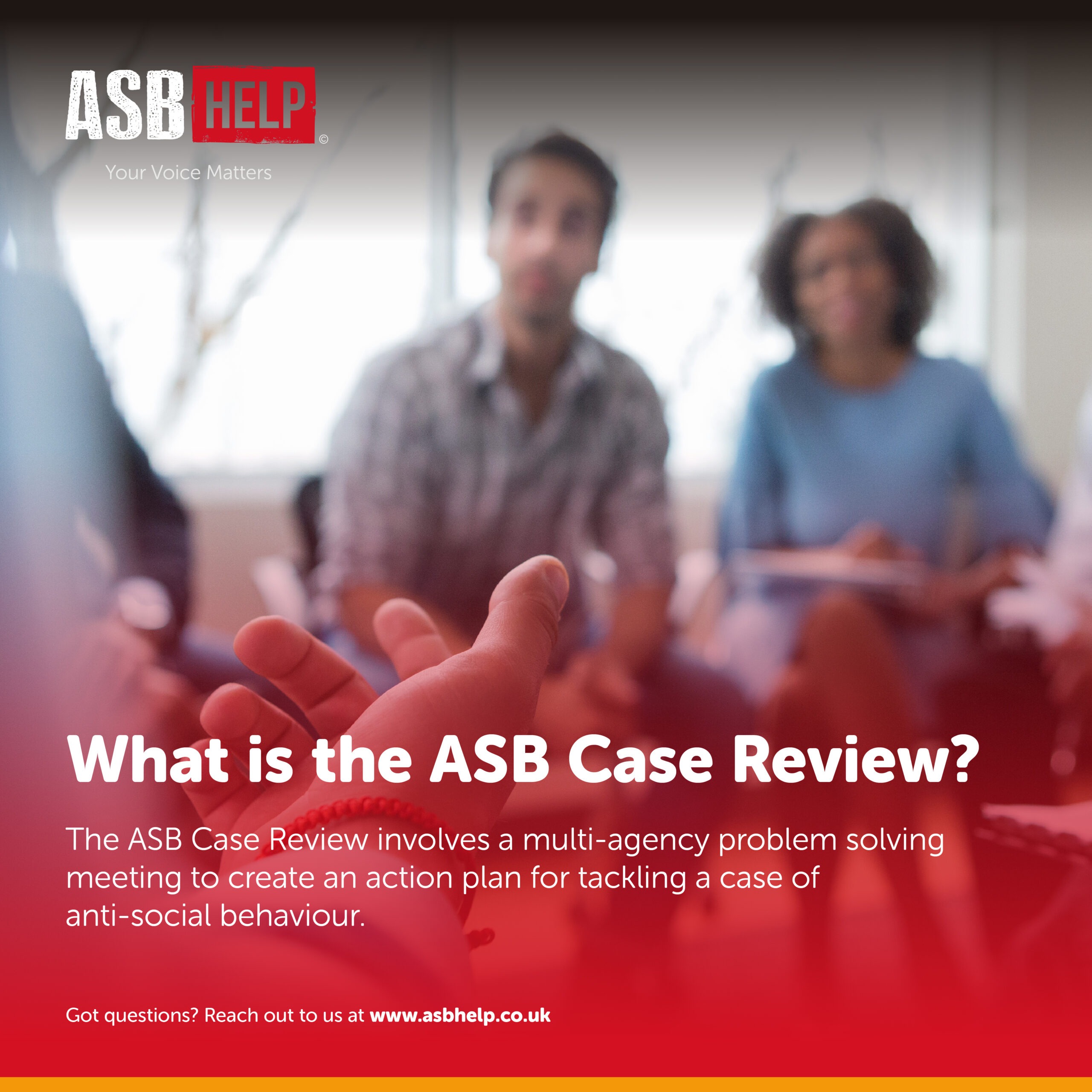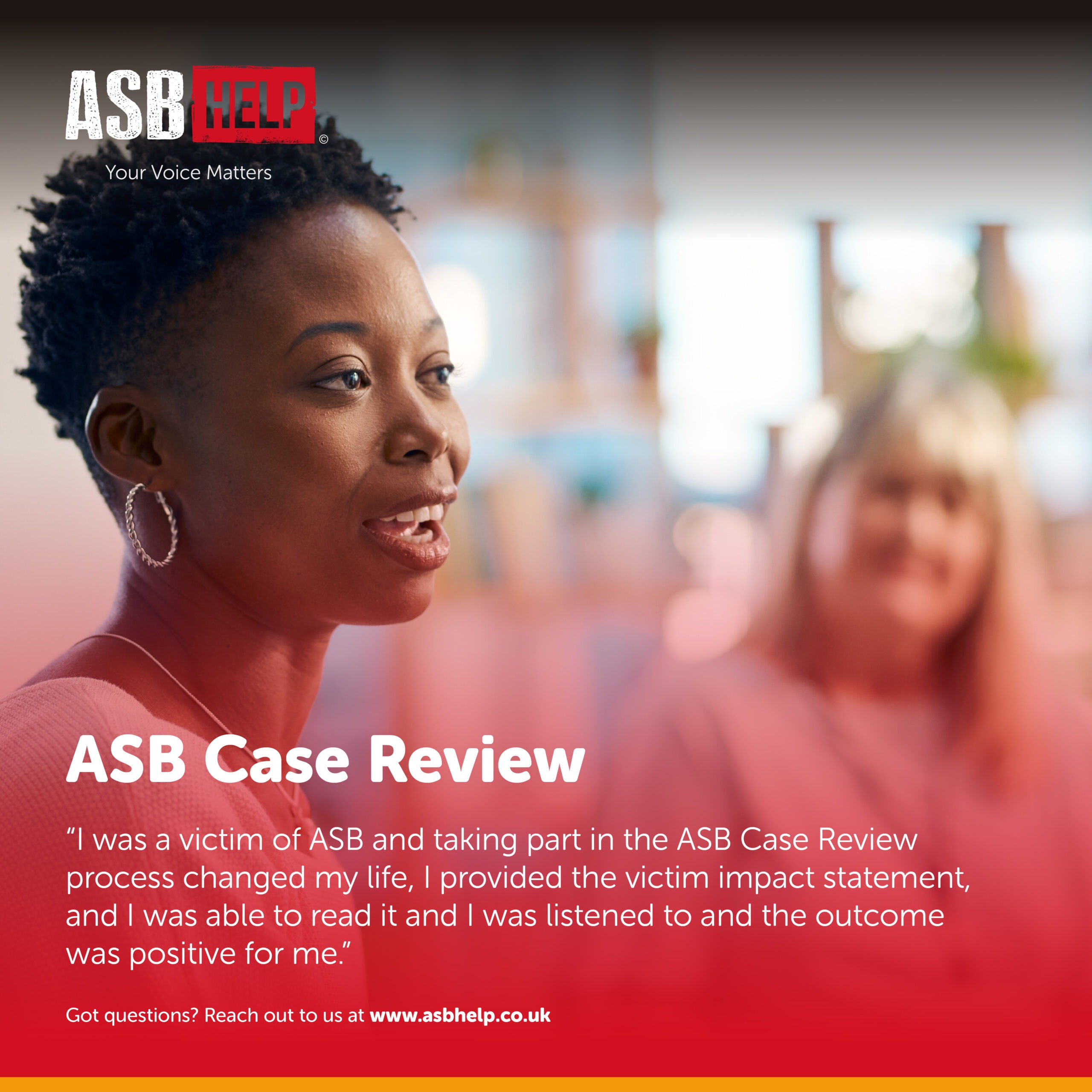PLEDGE Awareness Day: New sign-ups!
Introduction
As part of ASB Awareness Week this year, we are using the Wednesday to highlight The ASB Help PLEDGE.
Why did we launch The ASB Help PLEDGE?
Anti-social behaviour (ASB) can have a debilitating impact on a victim’s health and well-being and a devastating effect on the wider community.
There are many effective legal and non-legal tools to address ASB and these are used by organisations such as local authorities, police and housing providers throughout the UK. Unfortunately, there are times when despite the victim reporting these incidents to various agencies, the ASB persists. It is in these circumstances whereby the ASB Case Review proves to be an invaluable tool.
As straightforward as this may sound, we have seen differences across England and Wales in the administration and delivery of the ASB Case Review process where ultimately it is the victim who is affected as a result.
So we launched The ASB Help PLEDGE.
What is The ASB Help PLEDGE?
In response to the inconsistences around how ASB Case Reviews are carried out, we launched The ASB Help PLEDGE, which seeks to encourage all agencies involved in the ASB Case Review process to embed best practices into their policy and procedures. This helps us in our mission to ensure that the ASB Case Review is not a postcode lottery and that any victim of persistent ASB (when the threshold is met), regardless of where they live, are truly given a voice and partners work together, and problem solve to secure a satisfactory resolution.
By signing up to our ASB Help PLEDGE, we work with partners to ensure that they demonstrate their commitment to supporting victims of ASB, and will endeavour to implement and follow best practice with the ASB Case Review.
New sign-ups!
Over the past week, we have had multiple agencies sign up to/renew The ASB Help PLEDGE, including:
Thank you for your commitment to keeping victims at the heart of your ASB Case Review process!
Why sign-up to The ASB Help PLEDGE?
Speaking about The ASB Help PLEDGE, Jo Grimshaw, Head of Anti-Social Behaviour at Surrey Police stated:
Taking the ASB Help PLEDGE questionnaire will help make sure you are doing your best to let your victims know how they can get help if they feel they are not being listened to. Importantly ASB Help are there to guide you, offer advice and once you have completed the questionnaire, have your P&P checked and validated.
That’s what we did in Surrey Police and now we are proud to be able to use the ASB PLEDGE Logo to show our residents that we understand, support and value the process of the ASB Case Review.
Interested in signing up?
Government plans to improve the ASB Case Review process
Yesterday the government has announced plans to update the ASB Case Review process in response to the Victims’ Commissioner’s latest report: ‘Still living a Nightmare: Understanding the experiences of victims of anti-social behaviour‘.
Also in line with recommendations from our latest report: ‘The ASB Case Review: The victims’ voice or a box-ticking exercise?‘, the government plans to update the statutory guidance for the ASB Case Review to make them more accessible and effective for victims of anti-social behaviour.
The key changes to be made include:
- Agencies involved in the ASB Case Review should communicate the progress of the case and (where appropriate) provide victims with an opportunity to be involved in any meetings to share their views and help inform the action plan.
- Recommend that victims should have a single point of contact within the lead ASB Case Review agency.
- Recommend that ASB Case Reviews should have independent chairs so victims feel confident that their case review will be dealt with fairly and objectively.
- Set out what the rights of victims of ASB are in relation to the ASB Case Review.
- Recommend that areas should consider additional caveats carefully, and that victim-facing guidance explains that local areas can have different thresholds for activating the ASB Case Review and why this is needed.
The government also plans to explore options for making appeal rights clearer in the statutory guidance. Also, the Home Office is exploring how data on the ASB Case Review can be captured as part of regular statistical data collection from the police. They are also exploring options for strengthening the role of Police and Crime Commissioners in the ASB Case Review e.g. through PCC’s promoting awareness of the ACB Case Review, monitoring its use or providing a route for victims to query decisions.
We know from conversations with victims of anti-social behaviour that positive outcomes from an ASB Case Review often arise from feeling heard and feeling that the review was conducted fairly. Therefore, we welcome these updates to the current statutory guidance.
In addition to these amendments, a new Victims’ Code will be published later this year which will include victims of criminal anti-social behaviour within its scope, including “entitlement to expect to be able to access support services”.
Neighbourhood officers will also receive new bespoke training included in the Neighbourhood Policing Pathway programme to improve how police tackle anti-social behaviour.
ASB Help’s Chief Executive Officer, Harvinder Saimbhi has responded saying:
“ASB Help fully endorse the recommendations made in the report and are supportive of the government’s response. The report addresses victim’s experiences and pleas for help, which we at ASB Help are inundated with on a daily basis.
The most fundamental tool victims have is the ASB case review and this report clearly highlights that victims are unaware of their rights or how to access the case review.
We need to ensure that partners tackling ASB across England and Wales are appropriately trained to use the tools and powers available within the ASB Crime and Policing Act, and to tackle ASB effectively, bringing respite to those experiencing ASB.
We therefore welcome the government’s response and look forward to continuing to work with them, and other partners, to tackle ASB and ensure better protection and support for victims.”
The Victims’ Commissioner for England and Wales, Baroness Newlove responded:
“More must be done to support victims of anti-social behaviour, and I welcome the government’s response to my report as a positive first step.
My report highlighted the transformative impact of a single point of contact (SPOC) to ensure victims feel heard and supported, so I’m pleased this recommendation is being taken forward.
It is so important victims of ASB are given a voice and are listened to. Planned reforms to strengthen statutory guidance for the ASB Case Review process are a welcome measure to build trust and empower victims. For these reforms to have the greatest impact, changes to the law will be the crucial next step.
I look forward to working with the government to bolster protections and the law. The upcoming consultation on the Victims’ Code offers a key opportunity for progress. It is essential we get this right, as there is still much more to be done for lasting change.”
Our CEO, Harvi, appeared on Sky News this morning to discuss this announcement:
If you are being impacted by anti-social behaviour and don’t know where to turn, please get in touch
What the government's 'Plan for Change' means for anti-social behaviour
Over the past few weeks it has been very encouraging to see an ongoing focus on anti-social behaviour. With the recent announcements from the Home Office regarding neighbourhood policing guarantee, and the trial and introduction of Respect Orders, we are pleased that proactive steps are being taken to address prolific and deeply entrenched ASB in our communities.
Today’s speech from the Prime Minister, in his own words, “doubles down” on those pledges made in Labour’s manifesto, and their ‘Plan for Change‘. ASB is a scourge on a peaceful, respectful way of life, and all too often is brushed off as ‘low level’, or trivial. However, it devastates lives, and leaves a lasting impact on communities.
Victims repeatedly tell us they do not feel safe in their own homes, and they do not know who to turn to or even if they will be listened to. No one should EVER feel that way.
Management of ASB requires a multi-agency approach, with police, local authorities and housing providers working together with other experts to tackle the problem.
The pledge previously made and reinforced today as one of the government’s key milestones, of 13,000 Police Officers being channelled into neighbourhood policing, is a welcomed one. Victims deserve to know who they can talk to, they deserve continuity and an empathetic response and we hope that these new steps will reaffirm that confidence in our community safety teams.
ASB Help’s Chief Executive Officer, Harvinder Saimbhi was at Pinewood Studios this morning for the Prime Minister’s speech and says:
“Hearing the Prime Minister speak first-hand about the six key milestones this morning has given us further hope for the recognition of anti-social behaviour as a national priority. The neighbourhood policing guarantee, specifically the increase in neighbourhood officers, and named officers as a point of contact within communities will give great reassurance to victims. Victims who too often have to repeat reports to different officers and agencies and chase progress on their cases. Having dedicated, appropriately trained Police Officers who will be able to respond quickly, will support victims and community needs.
Over the years we have campaigned for specialist ASB officers and I am glad to see we are heading in the right direction. However, we must ensure these officers are not redeployed to other areas of policing as we have seen in the past.”
If you are being impacted by anti-social behaviour and don’t know where to turn, please get in touch
Respect Orders to tackle anti-social behaviour
ASB Help welcomes today’s announcement from the Home Office on the trial and introduction of Respect Orders. Anti-social behaviour continues to have a devastating impact on victims and communities across England and Wales. We are keen to see how this new power will be implemented and the effect it will have on the issues faced by victims across the country.
Following the Home Secretary’s announcement of major policing reforms, the Home Office has announced their plans to bring in new Respect Orders which will “subject repeat offenders of anti-social behaviour to tough restrictions on their behaviour”.
Here are the take aways from the Home Office’s announcement:
- Respect Orders will give police the power to ban persistent offenders from town centres, or from drinking in public spots.
- Perpetrators can be required to address the root cause of their behaviour e.g. via drug/alcohol treatment; similar to positive requirements seen under injunctions currently.
- Unlike injunctions, breaching a Respect Order will be a criminal offence – police will have the ability to immediately arrest anybody breaching their Respect Order.
- As well as prison sentences of up to two years, criminal courts will also be able to issue unlimited fines and community orders, such as unpaid work, and curfews as punishment for breaching a Respect Order.
- Police will have stronger powers to seize vehicles involved in ASB, no longer requiring to issue a warning before seizing the vehicle(s), including off-road bikes and dangerous e-scooters on pavements.
In response to this announcement, our CEO, Harvi, states:
“As the national charity that supports victims of anti-social behaviour, we regularly hear from victims who share with us the impact and harm they experience from repeated incidents of ASB. The lack of response from agencies leaves victims with little hope that the offenders will be dealt with robustly. Therefore, we are encouraged by the approach of addressing root causes of anti-social behaviour which will in turn work towards reducing reoffending rates, bringing respite to victims and communities.
It is important that the trial of Respect Orders is implemented effectively through comprehensive training which will give confidence to both the police and councils on how to use the new power.
It is vital that appropriate resources are provided to the key agencies who will provide the services, for offenders to undertake positive rehabilitation, such as attending drug or alcohol treatment services, or an anger management course to address the underlying causes of their behaviour.
We must also ensure there is robust monitoring and review of the Respect Orders during the trial period as we must get this right.
There must be a balanced approach to both dealing with persistent ASB in town centres and with those victims that face persistent ASB within their homes. The Respect Orders will complement the current tools and powers, and we look forward to their full implementation. We hope this will promote national consistency so that every victim, regardless of where they live in England and Wales, can feel confident that their ASB will be taken seriously and dealt with.”
Our Deputy CEO, Charlie, appeared on Sky News this morning to discuss these new powers:
ASB Awareness Week 2024
We want to highlight ASB Awareness Week this year by providing a wealth of information for practitioners and victims, in hopes of improving outcomes for victims of anti-social behaviour.
A few weeks ago, we launched our Your Voice Your Right campaign to raise awareness of the ASB Case Review. We want to highlight and continue this conversation to ensure it is not forgotten.
The daily themes for ASB Awareness Week 2024 are as follows:
Monday 18th – Partnership Day
Tuesday 19th – Victim’s Day
Wednesday 20th – “Let’s Talk ASB” Day
Thursday 21st – Community Heroes Day
Friday 22nd – Young People’s Day
Saturday 23rd – ASB and Health Day
Sunday 24th – Community Action Day
Each day we will be releasing videos, blogs, and/or case studies to raise awareness of anti-social behaviour and highlight good practice.
Please feel free to use any of the resources below to raise awareness of the ASB Case Review and best practices when conducting them.
Community Trigger workshop with Merseyside PCC - 23/06/21


Helping victims of ASB to get the right response
More than 30 community safety organisations will receive training today to ensure victims of anti-social behaviour get the right response, thanks to the region’s Police Commissioner.
Emily Spurrell has united with charity ASB Help to run the online workshop today (Wednesday 23rd June) which aims to increase awareness and understanding of the ‘Community Trigger’.
The Community Trigger, also known as the ASB Case Review, was introduced in 2014. It is a legal tool which gives victims of persistent anti-social behaviour the right to demand that local agencies review their response.
A member of the public can request a Community Trigger from their local council if they have reported three incidents of anti-social behaviour in the preceding six months, and they feel further action is needed to resolve their case. Anyone can activate the community trigger, including practitioners, with the consent of the victim.
Once a Community Trigger is activated, the local council must notify the other organisations involved, including the police, local health teams and registered providers of social housing, and hold a multi-agency case review, which sees all the various agencies come together to identify actions that can be taken to resolve the case.
If a victim is not happy with the response, they can appeal to the Police Commissioner who will examine the case review and may ask the agencies to conduct a further review of their case.
Today’s virtual training will be led by ASB Help’s Chief Executive Rebecca Brown, and is due to be attended by 33 representatives from partner organisations, including each of the region’s five Local Authority community safety partnerships, Merseyside Police, Merseyside Fire and Rescue and a host of housing associations and community organisations.
Merseyside’s Police Commissioner Emily Spurrell said: “The Community Trigger was brought in seven years ago to give victims of persistent ASB who feel nothing is being done and no-one is listening, the chance to get answers.
“Yet sadly, this important legal tool is still little known and little understood. I wanted to change that here in Merseyside, so that all the agencies involved in the process know how it should be used and feel confident promoting it to victims in their area.
“Anti-social behaviour is often, wrongly, viewed as ‘low-level’, but for victims who are repeatedly and persistently targeted it can have a hugely damaging effect, leaving people too scared to leave their front door and even afraid while they are inside their own home. It causes fear, stress, anxiety, depression. People who are subjected to this type of treatment deserve to get help and, if it isn’t forthcoming, they deserve to know why.
“I hope by running this training event today, more people will be able to come forward and get answers promptly and proactively. Crucially, I hope it will give more victims the confidence to come forward if they are suffering.”
ASB Helps’ Rebecca Brown said: “The community trigger is an essential mechanism for both victims and practitioners. It enables victims to use their voice and explain clearly the harm being caused to them and give their opinion on what a resolution would look like. For practitioners, it gives them back some control to raise the profile of a case and collaborate with community stakeholders to create an action plan to resolve it.”
Organisations were also invited to take ‘The ASB pledge’ – a six-point commitment which asks agencies to promote awareness of the Community Trigger, ensure their process is accessible and inclusive and puts the victim first
Dyfed-Powys Police have taken the ASB Pledge
Dyfed-Powys Police have taken the ASB Pledge.
We are delighted to work with Dyfed-Powys Police, who have taken the ASB Pledge, which commits officers and staff to giving victims of antisocial behaviour a voice. It is essential we put victims first.
Dyfed-Powys Police was awarded the ASB Help Pledge after creating a clear process which enables the force and partners to play an active role in resolving entrenched antisocial behaviour.
The pledge helps organisations to create effective policies that make it easier for victims to invoke the Community Trigger (also known as an ASB case review).
We hope more agencies take the ASB Pledge, so we can ensure victims are put first and Anti-Social Behaviour is resolved as quickly as possible.
Read more about how you can take the ASB Pledge here: https://asbhelp.co.uk/practitioners-hub/the-asb-pledge/
Read more on the Community Trigger here: https://asbhelp.co.uk/practitioners-hub/asb-case-review-practitioners/
Read the full story here: https://www.southwalesguardian.co.uk/news/19203853.dyfed-powys-police-awarded-commitment-victims-antisocial-behaviour/?ref=twtrec
Be part of our ASB Pledge!
Thank you Solihull Community Housing for hosting me this week to talk to you about the PLEDGE. Very encouraging that we have so many partners wanting to take the PLEDGE and work with ASB Help on promoting the voice of victim’s of anti-social behaviour. Particular thanks to Victim Support in Plymouth, Hyde Housing, Sheffield City Council, Leicestershire Police, Stoke City Council and Surrey Police….Be part of this campaign and get in touch with ASB Help today to find out more about how we can help you to deliver the best service to your residents.
You can find out more information on the Pledge here
The First National Voice for Victims of Anti-Social Behaviour
Press Release: The First National Voice for Victims of Anti-Social Behaviour
It’s High Time Victims of Anti-social Behaviour received help to know their rights and get results.
ASB Help has launched what it believes to be the first national charity focused on providing information and advice to victims of anti-social behaviour. Motivated by the tragedy of Fiona Pilkington who in 2007 took her own life and that of her daughter’s after police ignored her 33 pleas for help, ASB Help seeks to provide an impartial voice for vulnerable victims across the country and make sure the new legislation works in their favour.
Baroness Newlove, herself a victim of anti-social behaviour which resulted in the tragic death of her husband, has expressed her delight at the launch of this service acknowledging that “no one should have to suffer its [ASB] consequences in silence but unfortunately there are still so many people doing just that”.
ASB Help reports that although in its early stages it is already receiving evidence of such suffering – over a third of respondents to the charity’s online survey state they have reported the issue more than three times and 76% of respondents state their problem, although reported, has not yet been resolved. In fact, only 6% report a satisfactory resolution to the issue.
“It’s particularly concerning” commented CEO Jenny Herrera, “to see a survey respondent state they believe there is a hate incident against them and yet they either didn’t know they should have gone to the police, or they have and the harassment continues”. ASB Help hopes to guide victims of anti-social behaviour so that they can report it to the right agency in the right way and as the charity grows, provide much needed personal support to those who feel no one’s listening or are suffering in silence.
